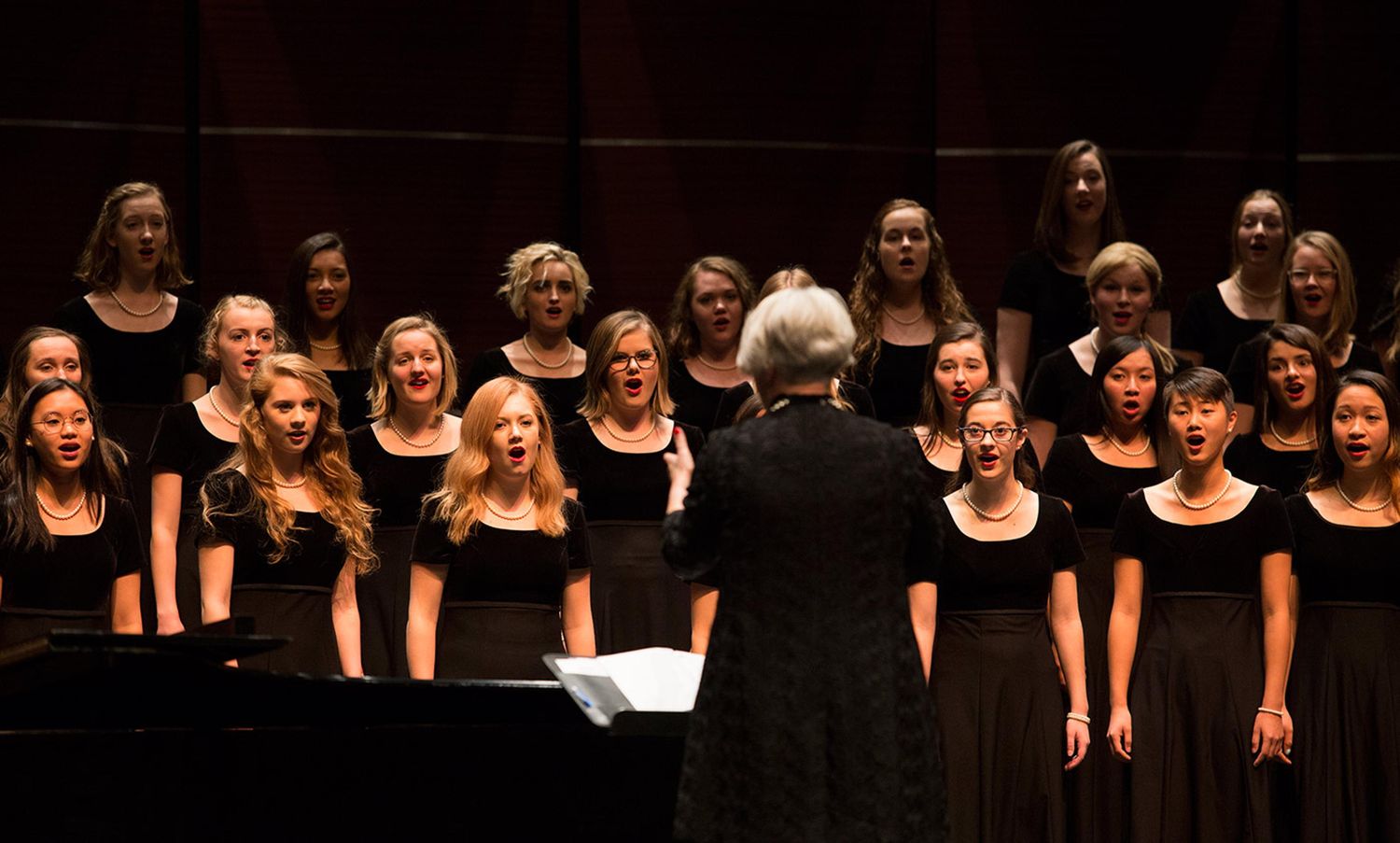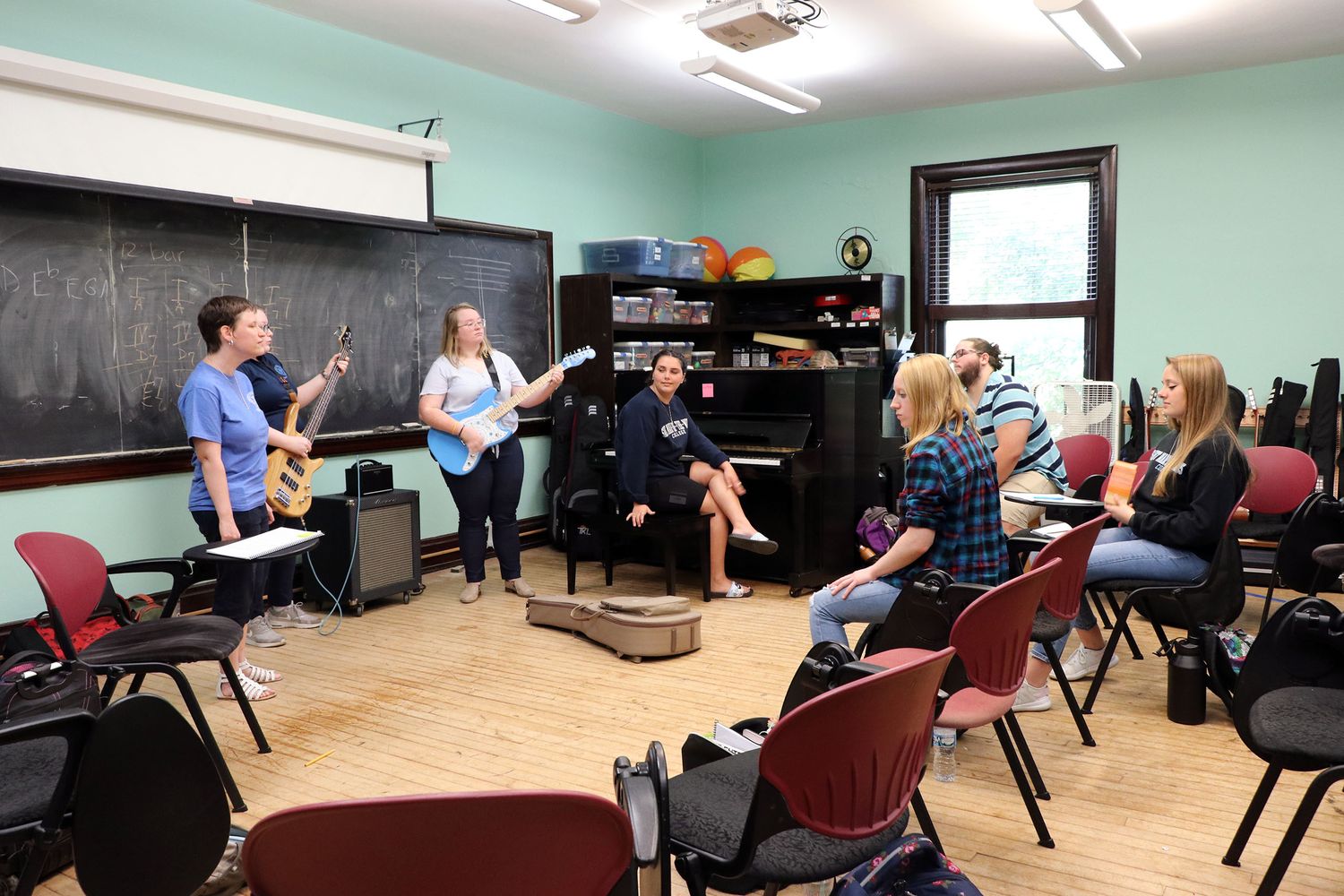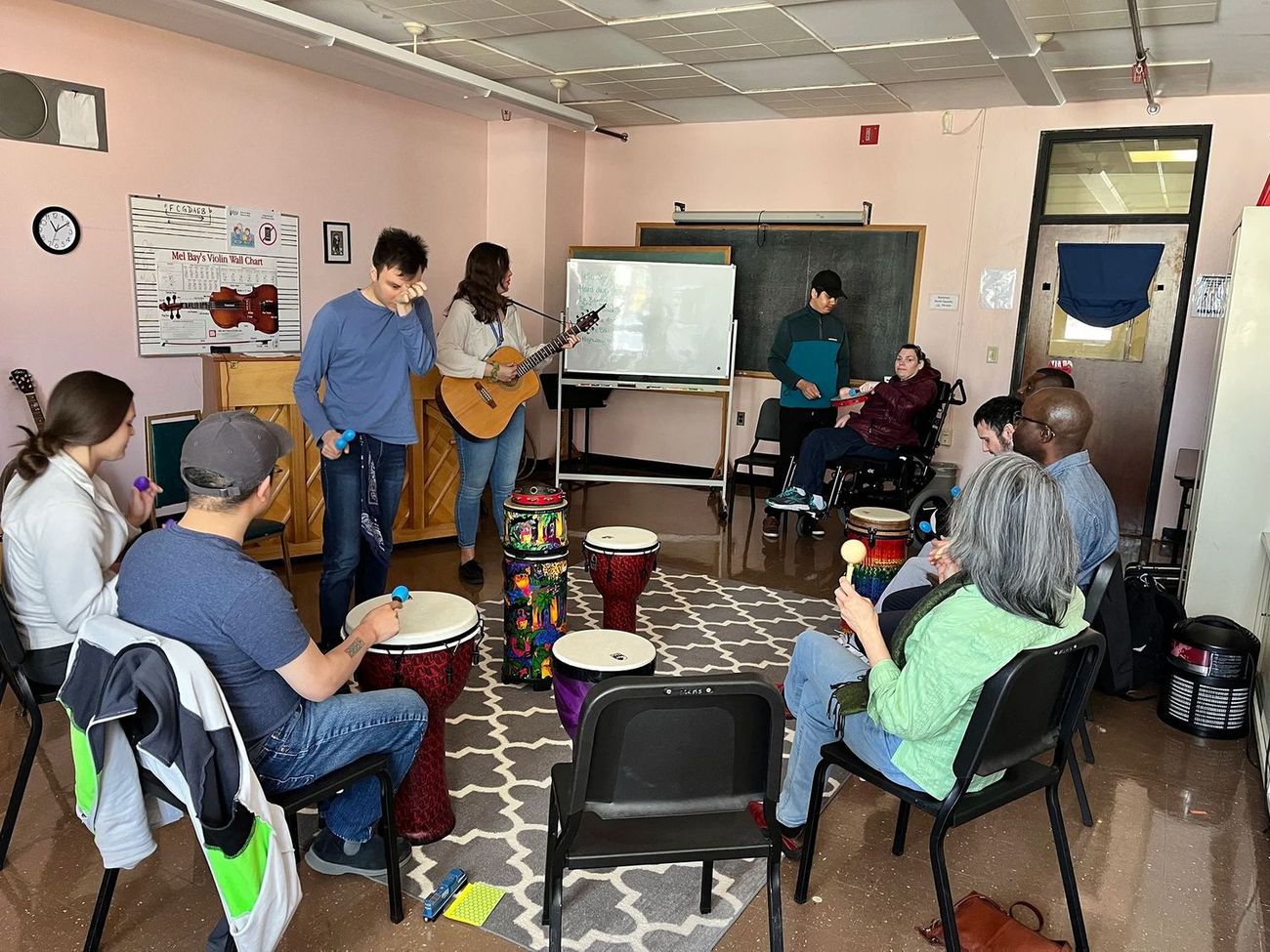Home>Events & Info>Acapella>How To Start An Acapella Group In College


Acapella
How To Start An Acapella Group In College
Modified: January 22, 2024
Learn how to start an acapella group in college and create harmonious melodies with fellow students. Discover tips and tricks for recruiting members, arranging songs, and performing at campus events.
(Many of the links in this article redirect to a specific reviewed product. Your purchase of these products through affiliate links helps to generate commission for AudioLover.com, at no extra cost. Learn more)
Table of Contents
- Introduction
- Finding Like-Minded Individuals
- Selecting a Musical Style
- Auditions and Recruitment
- Establishing Rehearsal Times and Locations
- Setting Group Goals and Expectations
- Arranging and Learning Songs
- Building a Repertoire
- Collaborating with Other College Groups
- Promoting and Marketing the Group
- Performing and Competing
- Managing Finances and Logistics
- Balancing Acapella and Academics
- Building a Sense of Community
- Reflecting and Evaluating
Introduction
Welcome to the world of acapella! If you have a passion for singing and are looking to start an acapella group in college, you’re in for a thrilling and rewarding experience. Acapella, which refers to singing without any instrumental accompaniment, has gained immense popularity in recent years, thanks to groups like Pentatonix and Pitch Perfect. Starting your own acapella group is a great way to showcase your vocal talents, make lifelong friendships, and bring joy to your campus community.
In this article, we will guide you through the process of starting an acapella group in college, from finding like-minded individuals to promoting your group and everything in between. Whether you’re an experienced singer or just looking to explore your vocal abilities, there’s a place for everyone in the acapella world.
Before diving into the nitty-gritty details, it’s important to have a clear understanding of what acapella is all about. Acapella music typically features tight harmonies, vocal percussion, and creative vocal arrangements. The absence of instruments allows singers to showcase their vocal range, control, and improvisational skills. It’s a genre that is not only musically intricate but also incredibly dynamic and captivating.
Starting an acapella group requires dedication, commitment, and a love for music. It’s a collaborative effort that will require you to work closely with your fellow group members to create something truly extraordinary. From auditions to performances, competitions to recording sessions, the journey of building an acapella group will be both challenging and immensely rewarding.
So, if you’re ready to embark on this exhilarating adventure, let’s dive into the critical steps involved in starting an acapella group in college.
Finding Like-Minded Individuals
The first step in starting an acapella group is to find like-minded individuals who share your passion for singing. This can be done by reaching out to fellow students through various channels such as social media, campus bulletin boards, or by word of mouth.
Consider putting up flyers or creating a social media group dedicated to acapella enthusiasts on campus. This will help spread the word and attract singers who are interested in joining your group.
It’s important to cast a wide net and invite singers from different backgrounds and vocal ranges. Diversity in your group will not only make your performances more interesting but also allow for a wider range of musical styles and genres.
Hold informational meetings or informal jam sessions to connect with potential group members. Use this time to get to know each other, share your musical inspirations, and discuss your goals and vision for the group. It’s crucial to find individuals who are committed, reliable, and willing to put in the necessary time and effort to make the group a success.
When searching for like-minded individuals, keep in mind that talent alone is not the only factor to consider. Look for singers who have a positive attitude, are easy to work with, and are open to collaboration and growth.
Additionally, consider reaching out to the music department or local choir groups on campus. Often, there are already established vocalists who may be interested in joining an acapella group. Collaborating with other musical organizations on campus can also provide opportunities for joint performances, workshops, and shared resources.
Remember, the goal is to find individuals who are just as passionate about acapella as you are. Building a cohesive and harmonious group dynamic will set a solid foundation for the success of your acapella group.
Selecting a Musical Style
Once you have assembled a group of like-minded individuals, the next step is to decide on the musical style or genre that your acapella group will focus on. The chosen musical style will shape the identity and sound of your group, so it’s important to consider the preferences and strengths of your members.
Start by exploring different genres of music together. Have group discussions and listening parties to introduce each other to various styles such as pop, jazz, classical, R&B, rock, or even a cappella arrangements of popular songs. Discuss which styles resonate with the group and align with your vocal abilities.
Consider the talents and vocal range of each member when deciding on the musical style. If you have members with exceptional beatboxing skills, you may want to incorporate more percussive elements into your arrangements. If you have members with powerful voices, you might lean towards genres that allow for soaring vocal solos.
It’s also essential to take into account the preferences of your target audience. Consider the demographics of your college campus and what type of music is popular among students. However, don’t be afraid to step out of the box and experiment with unique and original arrangements that can set your group apart.
Don’t limit yourself to just one musical style either. It’s common for acapella groups to showcase versatility by incorporating different genres into their repertoire. This flexibility not only keeps your performances interesting, but also allows you to cater to a wider range of audiences and events.
Remember, the musical style you choose should be a reflection of your group’s personality and the collective voices of your members. It should excite and inspire you to create captivating and memorable performances.
Once you’ve settled on a musical style, it’s time to move on to the next crucial step: auditions and recruitment. This process will help you finalize the members of your group and ensure that each voice complements one another harmoniously.
Auditions and Recruitment
Auditions and recruitment are vital steps in establishing the right vocal blend and talent within your acapella group. This process allows you to assess the skills and compatibility of potential members and ensure that the group is cohesive and harmonious.
You can organize auditions by setting up individual or group audition sessions. Individual auditions allow you to assess each singer’s individual strengths and weaknesses, while group auditions give you a sense of how well singers can blend and harmonize with others.
Prior to auditions, provide clear guidelines and expectations for what you are looking for in potential members. This may include vocal range, ability to hold harmonies, stage presence, and commitment level. You can distribute audition packets that contain information about the group, audition requirements, and sample songs for potential members to prepare.
During auditions, create a comfortable and supportive environment for singers to showcase their talents. Consider having a panel of judges, including current group members and musical directors, to provide different perspectives and expertise.
Listen for vocal ability, pitch accuracy, tone quality, and vocal range. Pay attention to how well singers can blend their voices with others and their ability to adapt to different musical styles. Look for individuals who show a willingness to learn, take direction, and collaborate effectively.
Remember to consider not just the technical aspects of singing, but also the overall energy and stage presence of the singers. Look for individuals who exude confidence, charisma, and a genuine love for performing.
After auditions, hold a callback session for potential members who show the most promise. This allows you to work with them in a more collaborative setting and see how well they fit into the group dynamic.
Once you have selected your members, make sure to communicate the decision to all auditionees in a respectful and timely manner. Offer feedback and guidance to those who did not make the cut, as it can be a valuable learning opportunity for them.
Once your group is formed, it’s time to establish rehearsal times and locations, so you can begin honing your craft and creating beautiful music together.
Establishing Rehearsal Times and Locations
Establishing consistent rehearsal times and finding suitable rehearsal locations is crucial for the success of your acapella group. This step ensures that everyone in the group can commit to regular practice sessions and provides a conducive environment for focused and productive rehearsals.
When determining rehearsal times, consider the availability and schedules of each member. Find a time slot that works for the majority, taking into account their class schedules, extracurricular activities, and other commitments. It’s important to be flexible and accommodating to ensure that everyone can attend rehearsals regularly.
Rehearsals can be scheduled weekly or multiple times a week, depending on the intensity and goals of your group. Consider the amount of time needed to learn and perfect new songs, work on vocal arrangements, and polish existing repertoire. Aim for rehearsals that are long enough to accomplish your objectives but not overly exhausting for the members.
Once you have established your rehearsal schedule, communicate it clearly to all group members and stick to it as much as possible. Consistency is key in developing strong vocal dynamics and ensuring a smooth workflow.
When it comes to rehearsal locations, explore the options available on your college campus. Many universities have dedicated practice spaces or music rooms that can be reserved for student groups. Check with the student activities office or the music department to inquire about the availability and procedures for reserving these spaces.
If dedicated practice spaces are limited, consider alternative locations such as empty classrooms, common rooms, or even outdoor spaces if weather permits. Ensure that the location provides adequate acoustics, privacy, and a comfortable environment for singing and practicing vocal techniques.
It’s important to be respectful of other groups and individuals who may also be using the same space. Establish guidelines for behavior during rehearsals, such as minimizing noise outside the designated area and being mindful of shared resources.
In some cases, you may need to be creative and resourceful in finding rehearsal spaces off-campus. Local community centers, churches, or music studios may offer rental options for practice rooms. Explore these options, keeping in mind the cost and accessibility for your members.
Remember to schedule regular breaks during rehearsals to give members a chance to rest, recharge, and socialize. These breaks can also be used for group bonding activities or addressing any logistical or administrative matters.
By establishing consistent rehearsal times and finding suitable locations, you set the foundation for productive rehearsals and a cohesive group dynamic. With your schedules in place, it’s time to discuss and set clear goals and expectations for your acapella group.
Setting Group Goals and Expectations
Setting clear goals and expectations is essential for the success and growth of your acapella group. It ensures that everyone is working towards a common vision and helps to create a sense of purpose and unity within the group.
Start by having an open discussion with all members to determine the collective goals of the group. Ask questions such as: What type of performances do you want to do? Do you want to compete in acapella competitions? Do you want to record and release music? Are there any specific events or gigs you’d like to participate in?
By having these conversations, you can align everyone’s aspirations and define a clear direction for your group. Consider creating a shared vision statement or mission statement that encapsulates the group’s objectives and values.
In addition to long-term goals, set smaller, achievable milestones to keep the group motivated and focused. These milestones can include learning a certain number of new songs, mastering challenging vocal techniques, or organizing a successful on-campus performance.
Once goals are established, discuss and establish expectations for group members. This includes commitment level, attendance at rehearsals and performances, participation in group activities, and professionalism. Be clear about the level of dedication and effort required to maintain the group’s standards and achieve the desired results.
Encourage open communication within the group and create an environment where members feel comfortable addressing concerns, sharing ideas, and providing constructive feedback. This fosters a supportive and collaborative atmosphere that allows everyone to grow and improve.
Assign roles and responsibilities within the group to ensure smooth operations. This can include appointing musical directors or section leaders who are responsible for leading vocal warm-ups, coordinating rehearsals, and offering guidance to other members. Delegate tasks such as managing social media accounts, organizing performances, or handling administrative duties to different members to distribute the workload and promote a sense of ownership.
Regularly revisit and evaluate the goals and expectations as the group evolves. Allow for flexibility and adjustments as needed, as long as they align with the collective vision of the group. Acknowledge and celebrate individual and group achievements to motivate and reward members for their hard work.
Remember, a group that has clear goals and expectations in place is more likely to stay focused, motivated, and cohesive. With your goals and expectations set, it’s time to dive into the exciting world of arranging and learning songs.
Arranging and Learning Songs
Arranging and learning songs is at the core of being an acapella group. It’s the process of taking existing songs or creating unique arrangements and adapting them to be performed without instrumental accompaniment. This step allows your group to showcase its vocal talents and create a signature sound.
Start by choosing songs that align with your group’s chosen musical style and cater to the preferences of your target audience. Consider selecting a mix of popular songs and lesser-known tracks to keep your performances engaging and varied.
If you have members with arranging skills, encourage them to create original arrangements for the group. This adds a personal touch and allows you to showcase your creativity as a collective. However, if arranging isn’t a strength within your group, you can explore existing acapella arrangements that are available online or collaborate with other acapella groups to share and exchange arrangements.
When learning songs, break them down into smaller sections and focus on mastering each part individually before combining them. Start by learning the melody and lyrics, then move on to harmonies, vocal percussion, and other vocal techniques. Practice each section slowly and gradually increase the tempo as the group becomes more comfortable.
Use various rehearsal techniques to solidify the group’s mastery of the songs. This can include singing scales and vocal exercises to warm up your voices, practicing vocal techniques such as vowel shaping and breath control, and conducting sectionals to refine specific parts.
Utilize technology to aid in learning and rehearsing songs. Recording rehearsals and performances allows for self-evaluation and identification of areas for improvement. You can also use audio recording software or apps to create demos and practice tracks for the group to rehearse with outside of the scheduled rehearsal times.
Encourage individual practice outside of rehearsals to ensure that everyone is familiar with their parts and can confidently sing them in a group setting. Provide resources such as sheet music, lyric sheets, and recordings of the songs to facilitate individual practice.
As you learn and perfect your songs, pay attention to the dynamics, vocal blend, and overall balance of the group. Experiment with different interpretations and vocal dynamics to bring out the emotional impact of the songs.
Continuously challenge yourselves by tackling more complex songs and vocal arrangements. This not only keeps things interesting for the group but also allows for constant growth and improvement. Don’t be afraid to push the boundaries and explore new vocal techniques and styles.
Remember, the process of arranging and learning songs requires patience, dedication, and a collaborative approach. With your songs arranged and learned, it’s time to build a diverse repertoire for your acapella group.
Building a Repertoire
Building a diverse and captivating repertoire is an important aspect of being an acapella group. Your repertoire showcases the range and versatility of your group’s musical abilities and allows you to cater to various audiences and performance opportunities.
When choosing songs for your repertoire, consider a mix of genres and styles that highlight the strengths and unique vocal dynamics of your group. This can include popular songs, classic hits, arrangements of current chart-toppers, or even songs from different cultural backgrounds.
Think about the flow and variety within your repertoire. Consider mixing up fast-paced, upbeat songs with more emotional ballads or intricate vocal arrangements. This adds a dynamic element to your performances and keeps your audience engaged.
Pay attention to the length of your songs and aim for a balanced setlist. Including songs of varying lengths allows you to tailor your performances for different event durations and ensures that you can showcase a range of material within a given time frame.
In addition to selecting songs, consider incorporating medleys or mash-ups into your repertoire. These can be unique arrangements that seamlessly blend together multiple songs, creating a fresh and exciting performance experience for your audience.
Regularly update and refresh your repertoire to keep your performances exciting and relevant. Stay up to date with current music trends and consider incorporating current chart hits or songs that resonate with your target audience. Collaborate and brainstorm with your group members to discover new songs and arrange them to suit your acapella style.
Once you have a repertoire in place, focus on rehearsing and polishing the songs to a high standard. Pay attention to vocal blend, harmonies, dynamics, and staging. Strive for precision in your performances while still conveying emotion and connection with the music.
Consider creating themed sets within your repertoire for specific performances or events. For example, you could have a set dedicated to love songs for a Valentine’s Day performance, or a set of holiday songs for a festive event. Themed sets add a cohesive and engaging element to your repertoire and allow you to cater to specific occasions.
Remember that building a repertoire is an ongoing process. Continuously seek feedback from your audience and fellow group members to gauge the impact and effectiveness of your song choices. Be open to making adjustments and additions to your repertoire based on the feedback received.
Having a strong and diverse repertoire not only elevates your performances but also opens up opportunities for collaborations, gigs, and competitions. With your repertoire in place, it’s time to explore collaborations with other college groups to enhance your acapella experience.
Collaborating with Other College Groups
Collaborating with other college groups is an excellent way to expand your musical horizons and create unique performance opportunities for your acapella group. By joining forces with other talented musicians on campus, you can create unforgettable musical experiences and foster a sense of unity within the college community.
Start by reaching out to other musical groups on campus, such as bands, orchestras, choirs, or dance troupes. Attend their performances and build relationships with the members. Networking and connecting with other musicians will open doors for potential collaborations.
Explore the possibility of joint performances or showcases. This can involve performing together on stage, alternating performances, or even creating collaborative music videos. Combining different talents and musical styles creates a unique and exciting experience for both the performers and the audience.
When collaborating, be open to exploring various genres and styles of music. This allows you to push the boundaries of your acapella group and experiment with different musical elements. For example, you could collaborate with a jazz band for a soulful rendition of a popular song or team up with a dance group for a visually stunning performance.
Consider participating in collaborative events or concerts organized by the college or other student-led organizations. These events offer a platform for showcasing your collaborative work and introduce your acapella group to a broader audience.
Collaborations can also extend beyond musical partnerships. Consider working with theater groups to create acapella arrangements for their productions or collaborating with graphic design students to create visually appealing promotional material.
When collaborating, effective communication and planning are key. Determine a timeline, exchange ideas, and establish roles and responsibilities for each group involved. Regularly meet and rehearse together to ensure the synchronization of music and performance elements.
Collaborating with other college groups not only enhances your artistic abilities but also builds connections within the college community. It fosters a sense of camaraderie and support among different artistic groups, leading to future partnerships and opportunities.
Document and promote your collaborations through social media, campus publications, and performances. Highlight the collaborative process and share behind-the-scenes stories to engage and captivate your audience.
Remember, collaborations allow you to explore new musical territories, create memorable performances, and forge lasting relationships with other talented individuals on campus. With successful collaborations under your belt, it’s time to focus on promoting and marketing your acapella group.
Promoting and Marketing the Group
Effective promotion and marketing are essential for building awareness and attracting audiences to your acapella group’s performances. By implementing strategic marketing strategies, you can showcase your talents, engage with your target audience, and create a buzz around your group both on and off campus.
Start by leveraging social media platforms to promote your group. Create dedicated accounts on platforms such as Facebook, Instagram, and Twitter. Regularly update these accounts with content such as rehearsal photos, performance videos, behind-the-scenes glimpses, and announcements about upcoming shows. Engage with your followers by responding to comments and messages, and actively share and interact with content from other groups or organizations that align with your group’s interests.
Utilize your college’s communication channels, such as student newsletters, online bulletin boards, and campus radio stations, to spread the word about your performances and activities. Submit press releases or event listings to local newspapers or college magazines to gain additional visibility within your community.
Consider producing high-quality promotional materials such as posters, flyers, and banners. Display them in prominent areas on campus, including student centers, dormitories, and music department notice boards. Clearly communicate essential details, such as performance dates, venues, and where to find more information.
Engage in outreach initiatives by performing at campus events, open mic nights, or community gatherings. Participate in talent shows or competitions that provide exposure beyond your college. Networking within the local music scene can lead to collaborative opportunities and future gigs.
Build strong relationships with campus organizations, such as student councils, cultural clubs, or event planning committees. Collaborating with these groups can offer opportunities to perform at their events or co-host showcases, expanding your reach to a wider audience.
Consider recording and sharing professional-quality videos of your performances on platforms like YouTube. This allows you to showcase your talent to a broader audience and can attract attention from potential event organizers or talent scouts.
Develop a professional and visually appealing website for your acapella group. Include information about the group’s history, current members, repertoire, and upcoming performances. Make it easy for visitors to contact and book your group for events.
As you promote your group, focus on building a strong brand identity. Invest in a visually appealing logo and consistent branding across all promotional materials. Use a catchy and memorable group name that reflects your style and musical identity.
Word-of-mouth promotion is also powerful. Encourage your friends and members of the group to share information about your performances with their networks. Host open rehearsals or casual performances to provide a glimpse into your group’s talent and style, inviting potential fans and supporters.
Remember, effective promotion and marketing require consistency, creativity, and proactive efforts. By implementing these strategies, you can grow your fan base, attract larger audiences, and create a strong presence for your acapella group.
Performing and Competing
Performing and competing are exciting opportunities for your acapella group to showcase your talent, entertain audiences, and gain recognition within the music community. Whether you are performing at on-campus events, local venues, or competing in acapella competitions, these experiences are essential for the growth and success of your group.
When performing, it’s important to create engaging and memorable experiences for your audience. Plan your setlist thoughtfully, considering the flow and variety of songs. Start with an energetic and attention-grabbing opener, sprinkle in crowd favorites, and end with a powerful closing number. Use choreography, stage presence, and interactions with the audience to enhance the impact of your performance.
Pay attention to the technical aspects of your performance, such as vocal blend, intonation, dynamics, and stage positioning. Rehearse thoroughly to ensure precise synchronization and master the elements that captivate your audience.
Be adaptable and willing to perform in different settings and venues. From auditoriums to cafes, each performance space presents unique challenges and opportunities. Adjust your dynamics and repertoire to suit the acoustics and vibe of the venue, making the most of the space to create a memorable performance.
Participating in acapella competitions can be a thrilling experience that pushes your group to excel. Research and identify reputable competitions that align with your group’s goals and interests. Prepare meticulously for these competitions, focusing on both musical excellence and stage presence.
Use competitions as opportunities to learn from other groups, receive feedback from judges, and network with fellow musicians. Attend workshops or critique sessions offered at these events to gain valuable insights and improve as a group.
Remember, competitions should not be solely focused on winning. Instead, view them as opportunities to grow and showcase your group’s unique style and abilities. Support and cheer on other groups, fostering a sense of camaraderie within the acapella community.
After each performance or competition, take the time to debrief as a group. Reflect on your strengths, areas for improvement, and overall performance quality. Encourage constructive feedback from all members to continually refine your performances and raise the bar for future events.
Take advantage of post-performance publicity opportunities. Collaborate with photographers and videographers to capture high-quality images and videos of your performances. Share these on your social media platforms and website to engage with your audience, attract new fans, and showcase your group’s talent.
Performing and competing provide valuable exposure and allow you to connect with fans and fellow musicians. Embrace these opportunities with enthusiasm, professionalism, and a passion for creating unforgettable musical experiences.
Managing Finances and Logistics
Managing the financial aspect of your acapella group is crucial for sustainability and ensuring smooth operations. By establishing effective financial management practices and handling logistics efficiently, you can focus on your music and performances without unnecessary stress.
Start by creating a budget for your group. Determine your expected income sources, such as performance fees, merchandise sales, or fundraising events. Consider expenses such as rehearsal space rentals, costumes, transportation, competition fees, and equipment maintenance. Set financial goals and allocate funds accordingly to cover these expenses.
Consider establishing a group fund or membership dues to cover ongoing expenses. Determine reasonable dues or membership fees that align with the financial capabilities of your group members. Clearly communicate the purpose of the fees and how they will be utilized for the benefit of the group.
Develop a system for tracking income and expenses. Use accounting software or create a spreadsheet to monitor financial transactions and maintain accurate records. It’s crucial to keep thorough records of all financial activities to ensure transparency and accountability.
Explore fundraising opportunities to supplement your group’s income. Organize events like benefit concerts, bake sales, or online fundraisers. Reach out to your college community, local businesses, and alumni for potential sponsorship or donations. Consider selling merchandise, such as t-shirts or CDs, to generate additional revenue.
When it comes to logistics, effective communication and planning are key. Establish clear channels of communication within the group, ensuring that all members are informed about rehearsals, performances, and other important updates. Utilize digital platforms like email, messaging apps, or group management software to facilitate efficient and timely communication.
Create a master calendar to keep track of important dates, such as performances, rehearsals, competitions, and fundraising events. Share this calendar with your group members so everyone is on the same page and can plan their schedules accordingly. Regularly review and update the calendar to avoid conflicts and ensure smooth coordination.
Coordinate transportation arrangements for performances and competitions. Determine the most cost-effective and practical mode of transportation, whether it’s carpooling, renting a van, or utilizing public transportation. Designate a logistics coordinator within the group to handle transportation logistics and ensure that everyone arrives at the venue on time.
When booking performances or securing rehearsal spaces, establish clear agreements and contracts with the venue owners or event organizers. Clarify payment terms, sound system requirements, and any specific requests or arrangements you may have. Maintain regular communication leading up to the event to handle any last-minute changes or logistical details.
As your group grows and takes on larger projects, consider forming a leadership team or executive board. Assign specific roles and responsibilities to different members, such as a treasurer or logistics coordinator, to distribute tasks and ensure smooth operations.
Regularly review and assess your financial and logistical practices to identify areas for improvement. Hold periodic meetings to discuss any financial challenges, propose solutions, and make informed decisions for the benefit of the group.
By managing finances and logistics effectively, you can ensure that your group operates smoothly and that you can focus on what you do best – creating beautiful music and captivating performances.
Balancing Acapella and Academics
Balancing acapella commitments with academics is essential to ensure that both aspects of your college life receive the attention they deserve. With proper time management and prioritization, you can excel in both areas without compromising your performance or grades.
Start by creating a schedule that includes dedicated time for academics and acapella. Map out your class schedule, study sessions, and assignment deadlines, taking into account the time needed for acapella rehearsals, performances, and other group activities.
Be realistic when planning your time and avoid overcommitting. Understand your academic workload and allocate sufficient time for studying and completing assignments. Communicate your availability and limitations to your acapella group so that they can plan rehearsals and performances accordingly.
Develop effective study habits and time management techniques to maximize productivity. Make use of study breaks and downtime between classes to review notes or work on assignments. Utilize campus resources such as libraries, study groups, or academic support centers to enhance your learning experience and stay on top of your coursework.
Communication is key when it comes to balancing acapella and academics. Keep your group members informed about your academic commitments and any conflicts that may arise. The more open and transparent you are about your schedule, the better your group can accommodate and support you.
Plan ahead and prioritize tasks based on deadlines and importance. Break larger assignments into smaller, manageable tasks to avoid last-minute cramming or rushed performances. Make use of to-do lists and organizers to stay organized and ensure that nothing falls through the cracks.
Find ways to integrate acapella and academics whenever possible. For example, if you have a presentation or project for a class, consider incorporating an acapella performance or using it as an opportunity to showcase your musical abilities. Be creative and look for ways to merge your passions and academic pursuits.
Set boundaries and establish a healthy work-life balance. Dedicate specific time slots for relaxation, self-care, and social activities. Taking breaks and engaging in activities outside of acapella and academics can help prevent burnout and maintain overall well-being.
Seek support from your group members, friends, and family. Surround yourself with a strong support system that understands the demands of both acapella and academics. Lean on your fellow group members for encouragement, understanding, and assistance when needed.
Remember, while acapella is a passion and an important part of your college experience, academics should remain a top priority. Strive for excellence in both areas by managing your time effectively, communicating openly, and maintaining balance. By striking this balance, you can thrive both academically and musically during your college journey.
Building a Sense of Community
Building a sense of community within your acapella group is essential for fostering strong relationships, trust, and camaraderie among its members. Creating a supportive and inclusive environment will not only enhance the group dynamic but also contribute to the overall success and longevity of your group.
Encourage open communication and active participation within the group. Create a safe space where members feel comfortable sharing their ideas, concerns, and inspirations. Foster an atmosphere of respect and empathy, where everyone’s voice is heard and valued.
Organize regular bonding activities outside of rehearsals and performances. Schedule social events, game nights, or group outings to foster connections and create opportunities for members to get to know each other on a personal level. Building strong relationships will enhance collaboration and cohesion within the group.
Highlight individual accomplishments and celebrate milestones as a group. Recognize and appreciate each member’s unique talents and contributions. Acknowledge birthdays, academic achievements, or personal triumphs to show support and build a sense of belonging.
Encourage mentorship and peer support within the group. Foster an environment where more experienced members can provide guidance and support to newer or less experienced members. Pair individuals together for mentoring or establish a buddy system to ensure that everyone feels supported and included.
Promote a culture of growth and continuous improvement. Encourage members to set personal and group goals, and work together towards achieving them. Provide constructive feedback and opportunities for individual development. Establish a mindset that embraces challenges and fosters a spirit of resilience and personal growth.
Collaborate with other acapella and music groups on campus. Attend their performances, support their events, and build connections. Engaging with other groups within the college community not only enriches your musical experience but also expands your network and strengthens the sense of community within the larger music community.
Engage in community service or volunteer activities as a group. Use your musical talents to bring joy to others by performing at local hospitals, nursing homes, or charity events. Contributing to the community can foster a sense of purpose and unity within your group.
Celebrate and embrace diversity within the group. Recognize and appreciate the unique backgrounds, talents, and perspectives that each member brings. Create an inclusive environment where everyone feels valued and respected, regardless of their race, gender identity, or musical background.
Establish traditions and rituals within your group. Whether it’s a pre-performance ritual or an annual getaway, these traditions create a shared sense of identity and foster long-lasting memories. Traditions can strengthen the bond among group members and provide continuity as members come and go.
Regularly revisit the group’s values and mission. Have discussions about what the group stands for and how you can collectively uphold those values. This reaffirms your group’s identity and keeps everyone aligned with the shared purpose.
Building a sense of community within your acapella group requires patience, effort, and a commitment to creating a positive and supportive environment. When everyone feels a sense of belonging and connection, the group thrives and produces music that truly resonates with both the members and the audience.
Reflecting and Evaluating
Reflection and evaluation play a vital role in the continuous growth and improvement of your acapella group. Taking the time to reflect on past performances, assess your progress, and evaluate your group dynamics can help identify areas of strength and areas that need improvement.
After each performance or rehearsal, hold group discussions to reflect on the experience. Encourage members to share their thoughts, feedback, and observations about the performance. Discuss what went well, what could be improved, and any challenges that were encountered.
Regularly review recordings of your performances to gain a more objective perspective. Analyze vocal techniques, harmonies, dynamics, stage presence, and overall group cohesion. Use these recordings as learning tools to identify areas for growth and refinement.
Seek feedback from trusted sources outside of the group. Collaborate with music faculty, local musicians, or experienced vocalists who can provide constructive criticism and guidance. External perspectives can offer valuable insights and help you see your group from a different angle.
Evaluate and update your goals as a group. Are you progressing towards your long-term objectives? Are there any new aspirations or areas of focus that should be incorporated? Regularly discuss and reevaluate your goals to ensure that they are relevant and meaningful to the group’s development.
Assess your group dynamics and communication. Are there any interpersonal challenges or conflicts that need to be addressed? Foster an environment where open and honest communication is encouraged. Regularly check in with group members to gauge their satisfaction and address any concerns that may arise.
Consider conducting anonymous surveys or evaluations to gather feedback from group members. This allows individuals to express their thoughts and opinions freely. Use this feedback constructively to address areas for improvement and strengthen the bonds within the group.
Recognize and celebrate the achievements and growth of individual members and the group as a whole. Revisit milestones and milestones reached, recalling the progress made since the group’s inception. Celebrate efforts, collaborations, personal growth, and the shared musical journey of your acapella group.
Reflect on the impact your performances have on the audience. Consider their reactions and emotional connections to your music. Feedback from the audience is essential in gauging the effectiveness of your performances and understanding what resonates with your listeners.
Regularly assess your group’s rehearsal and performance practices. Are there any areas where you can improve efficiency, productivity, or creativity? Experiment with different rehearsal techniques, warm-up exercises, or coaching sessions to enhance the quality of your rehearsals and performances.
Embrace a growth mindset as a group. Recognize that growth and improvement are ongoing processes. Embrace challenges and view them as opportunities for learning and development. Encourage a culture of continuous improvement and support each other in reaching new heights.
Ultimately, reflection and evaluation are essential elements in the journey of an acapella group. By regularly reflecting on your performances, evaluating your progress, and seeking feedback, you can continuously evolve as musicians, strengthen your group’s dynamics, and deliver awe-inspiring performances that leave a lasting impact.











